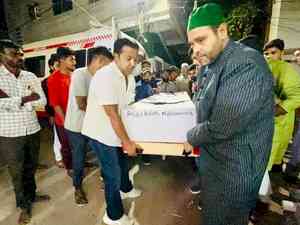Rural uplift schemes to be redesigned: Minister (IANS Interview)
New Delhi, July 7 (IANS) The UPA government's flagship schemes for rural areas will be retooled and redesigned in keeping with Prime Minister Narendra Modi's vision that "villages should have amenities as cities", Minister of State for Rural...

New Delhi, July 7 (IANS) The UPA government's flagship schemes for rural areas will be retooled and redesigned in keeping with Prime Minister Narendra Modi's vision that "villages should have amenities as cities", Minister of State for Rural Development Upendra Kushwaha has said.
Now called the "rurban" concept under the Modi government, after it was kicked off as Providing Urban Amenities in Rural Areas, or Pura in short, some 12 years ago, all linked schemes will be racast so to focus on overall development and asset creation, along with job creation with a purpose, Kushwaha told IANS in an interview.
"We are studying it. We will redesign it. Our villages must have road connectivity. They must have electricity and knowledge connectivity. The prime minister has said villages should have amenities of cities, but we must preserve their ethos," he said, ahead of the national budget for this fiscal to be presented Thursday that will assign money for such schemes.
The 54-year-old minister, who heads the Rashtriya Lok Samata Party (RLSP) and represents Karakat in Bihar, said that the Pura Scheme, as it was being implemented by the previous United Progressive Alliance (UPA) government, had not been very effective.
"Group of villages in a cluster should not only have proper roads and schools but also avenues of employment, with an extended scope for agro-based industries," said Kushwaha, who is also a minister of state for panchayati raj and drinking water and sanitation.
Referring to the Mahatma Gandhi National Rural Employment Guarantee Scheme, a flagship programme of the UPA that promises a minimum 100 days of work each year to a member of every rural household, he said it lacked focus on asset creation.
"The scheme will be recast to focus on convergence of activities and creating assets," he said about the programme, on which the government spent an average of Rs.36,000 crore each in the past three years, with wages amounting to around Rs.25,000 crore per annum.
India has about 730,000 villages and around 830 million people reside in them.
Kushwaha also cited instances of duplication in government schemes, and said works related to water preservation, for example, were done under both the job guarantee programme as well as the ministries of panchayati raj and drinking water and sanitation.
"There is no deficiency of funds. Just that the schemes are scattered," the minister told IANS.
An official in the ministry, which has been implementing the job guarantee scheme, said the focus must also shift from demand-based employment to project-based services.
"An asset register must be maintained by every panchayat that will clearly state whether the work done has resulted in a non-income generating asset or an income-generating asset."
Indicating some of the measures on the anvil, the official said convergence will be key in all rural schemes -- funds for job guarantee programme will be linked to schemes to build rural roads and for activities such as tree plantation.
A pet project of former president A.P.J. Abdul Kalam that he proposed in 2003, Pura was launched as a pilot programme by the UPA from 2004-05 to 2006-07. Later, the rural development ministry launched it by combining infrastructure development and economic regeneration activities in rural areas in a public-private partnership model.
(Prashant Sood can be contacted at [email protected])

 cityairnews
cityairnews 














